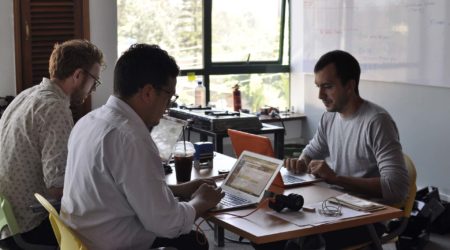Does your startup struggle to find talent? Four ways to grow your own

Although startups consistently report they struggle to find talent, few consider interns to be a viable pathway. This is usually because early-stage startups with small, busy teams don’t have time to manage or train interns. However, we have found that end-to-end recruitment support for junior talent can make all the difference, allowing startups to focus their efforts on grooming high-potential young hires to meet key business needs.
Most startup support and accelerator programs recognize that these small, dynamic organizations lack formalized HR and management processes. For the most part, this isn’t an obstacle to growth so programs like ours have disregarded this area of the organization. However, recruitment and screening efforts tend to fall within this category and are also neglected, meaning that the talent pipeline often falls short.
To address this dynamic, Catalyst Fund recently launched a talent program to recruit, place, and fund interns at our portfolio of startups. We also support these interns with training and professional development opportunities alongside their internships. To date, we’ve placed 19 interns at 11 Catalyst Fund portfolio companies in seven markets. In the six months since the program launched, we’ve already seen those internships lead to full-time offers, a sure sign that interns’ contributions have been worthwhile for startups. Further, we are seeing that portfolio companies are willing to fund interns that have been recruited by Catalyst Fund and supported by our program.
Given how reluctant startups can be to accept interns (even though the experience can be transformational for young talent), we spoke with founders to understand what is making these experiences a success. In all, we feel there is no better time for startups to invest in interns. Without opportunities to travel and with many companies cutting back on auxiliary programming like internships, startups can just as easily recruit from London as from Lagos, accessing a top-tier talent pool.
So how can startups get the most out of internships?
To start, Catalyst Fund helps set the stage for success by helping founders craft concrete, achievable job descriptions and shortlisting an initial pool of candidates. Before internships have been begun, our team has made sure that the startup has set clear, reasonable expectations so that the intern has something to do as soon as they arrive on day one. Simultaneously, our team ensures that the candidates presented to the startup are capable and equipped to execute on the work described.
With this foundation, the key to getting valuable contributions from an intern is to provide a valuable experience for the intern in the startup. While many startups feel this might require management structures, training, and incentives, we have observed that there are four simple strategies startups can employ to give junior professionals a valuable experience and, ultimately, grow the talent the company needs.
1. Give the intern a project to own
Besides typical intern work (e.g., tasks and assistance for broader ongoing projects), giving interns a project to own from start to finish allows them to demonstrate what they can do when working independently. Moreover, such opportunities give them a sense of confidence and the opportunity to grow their skills. Startups always need extra hands, so why not take a concrete, outstanding business need that is less urgent and always gets pushed to “later”, or a research-based question, and allow the intern to take the lead? In the end, the startup is better off for having made some progress and the intern will have the opportunity to grow.
David O’Brien, CEO of Meerkat in South Africa, tasked intern Sandisiwe Yengeni with owning an international expansion strategy. The task was a large scope, not urgent, and allowed for some creativity. To get her started, David shared an overview of his thinking, and then gave Sandisiwe the space to outline a research approach. Then, they refined the approach together before she started executing the research. As the project moved along, David was able to observe Sandisiwe’s capabilities and ultimately pulled her into other more urgent business priorities.
2. Leverage Slack (or another messaging tool) as an “open door policy”
It can be difficult to find the balance giving interns enough supervision and advice, while also conserving precious leadership capacity. Instead of hands-on management, interns can benefit from an ‘open door policy’ so they can observe and absorb passively, asking their manager questions when needed. Slack, or other messaging tools, provide an unparalleled opportunity for interns to “watch and learn”, and easily engage and ask questions instead of interrupting meetings or requiring individual emails. These quick messaging tools make the whole team seem accessible as interns can browse channel content to understand different workstreams and then take initiative to learn and probe further.
Our interns report that such observation is very meaningful and accessibility to the broader team is pivotal to their experiences. An intern at Cowrywise, highlighted that “the entire team, including Razaq Ahmed the CEO, was responsive almost 24/7 and always willing to provide support and guidance whenever needed.” Razaq mentioned that integrating an intern into the company culture is challenging virtually, but that digital channels allowed the intern to work directly with the digital marketing and design team. This accessibility helped her to successfully execute on major projects such as App Store Optimization, email marketing, and web landing page content.
With remote internships and interns working from all over the world, time zones can present a challenge, but informal messaging tools decrease communication barriers. For example, the Cowyrwise intern mentioned above worked from New York City. With remote work, these tools also encourage friendly interactions, making the intern feel more connected to the team, even during a short engagement.
3. Set learning goals with the intern and stick to them
Learning experiences are key to retaining talent and letting the intern partially drive their agenda will make them even more invested in the outcomes. We have observed that a great learning experience begins with the intern defining a maximum of three major learning outcomes for the engagement. These should be broad, such as ‘improve skills in backend software development’ or ‘learn about customer acquisition through social media’. With these in mind, the supervisor can define projects, allocate tasks, and give the intern exposure across the business in ways that support reaching these goals. At fixed points throughout the internship, at least the midpoint and endpoint, the supervisor can lead a conversation with the intern to revisit the goals and reflect on progress.
It can be tempting to pepper an intern across the business so they can understand the bigger picture and get exposure to all facets of the business, but focusing on the intern’s core learning themes gives them a better chance to contribute. This approach also shows the intern that you are invested in their development, while giving them a chance to build their expertise.
Karla Solares, a software developer intern at Destacame in Mexico, is self-taught coder who wanted to build expertise in backend development as part of her first professional experience in software engineering. Her learning goal was communicated to her supervisor, who committed to helping her build those skills and grow her abilities as a developer in the real world.
4. Invest time early for superior contributions
It is no secret that supporting an intern can take a lot of time, but spending more time in the first month of a six-month internship, rather than at the end, can position both the startup and the intern for success.
Ideally the intern’s supervisor is not the CEO, but rather a team lead who can oversee the intern’s work and integrate them into a smaller group within the larger team. In the first month, the supervisor should plan to kick off the intern’s project and other deliverables in a series of meetings so as to dedicate several hours to getting the intern up to speed. This could be 30 minutes two or three times per week, plus longer sessions as needed to help push the intern’s work forward. The supervisor should provide the intern with a framework to prepare for the meetings, which could include a project progress update, outstanding questions about assigned work or the company in general, and any other observations or work areas the intern may want to get involved in. Once the work is up and running, these meetings can be scaled back dramatically.
At Spoon Money, tech-lead Dan Bosman has been supervising intern Kenneth Mphela. Dan invested significant time with Kenneth over the first month with almost daily meetings, which has allowed Dan to eventually pass on key responsibilities to Kenneth, thus freeing up Dan’s time to research new implementations. Kenneth quickly got the background needed to start contributing early, and Dan has been able to increasingly offload to Kenneth, expanding the overall tech capacity of the Spoon Money team. Owning substantial pieces of work are giving Kenneth experiences to prepare him for a career as a full stack developer.
Interns can make huge contributions if given the right support
The team at Asaak, which provides digital asset financing to SMEs in Uganda, are still using the pricing model, analytical dashboard, and loan performance analysis that were Ozioma Paul’s project during her four-month remote internship. Dylan Terrill, Asaak’s Chief Business Officer, said that by the end of the internship, Asaak had gotten a lot out of the internship, and noted that it’s “valuable to get outside perspective of someone who isn’t a full-time employee who can give a new direction thinking about a problem we haven’t addressed or are having trouble with.”
In all, we are proud that our effort to address talent challenges is having such positive results for startups and for young professionals alike. We have realized that alleviating the recruitment burden so startups can dedicate their time to supporting capable interns to actually deliver is a meaningful contribution. Additionally, interns report that the Catalyst Fund support of 1:1 meaning, a cross-learning workspace, an introduction to fintech training and more, provides the critical infrastructure for them to get the most out of their experiences. We hope that more startups will find interns to be a valuable addition to their teams.


